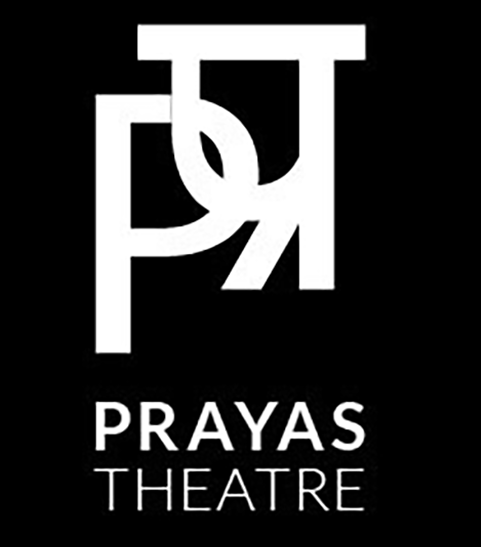“काय रे, कुठे होता अड्डा आज ?” (So, where was the Adda to day?)

I would be welcomed with this question when I returned home much, much, much later than promised. I had of course lost track of time because I was at adda, enjoying free-wheeling banter with friends as moments morphed into the memories.
What is an Adda, you ask?
One translation for Adda is a “hangout” (amongst others), a Bengali term for an informal gathering of people, has been adopted all over India since. Meant to be a place for friends to hangout, these gatherings have ranged from the meaningless – just a few guffaws over endless cups of chai or coffee; to the mighty – the spurring many political movements. A common theme throughout, the enthusiastic participation and the relaxed atmosphere.
Our Adda started off as a gathering of creatives that have collaborated with over its 15-year existence in 2019. Since then it has grown and taken on a life of its own.
At the heart of Prayas, is community. A member of the company since 2014, I have thrived in this feeling of belonging. As much as one looks forward to theatre and the performance aspects of the productions, the gathering of like – minded creatives has been just as important to me.
My first brush with Prayas was too late if you ask me. I have always had the flair for theatrics and it finally found an output in my second year in Aotearoa. On Facebook, I saw an open audition for a play titled Mumbai Monologues being produced by Agaram Productions, led by Ahilan Karunarhan.
The first thing that struck me once I got to the auditions was the relaxed atmosphere. Gone were the nervous actors pacing up and down as they eyed up the competition, instead actors streamed in and were greeted with a warm hug and yarn about where they had been since the last production. There was a genuine connection amongst them. Prayas, I have since learnt, was this connection and I was sold.
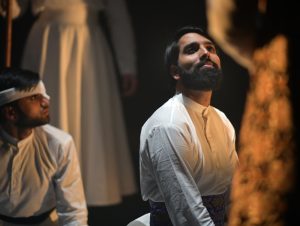
Just as I got cast in one of the monologues unbeknownst to me then, my life was about to change. The Prayas whanau embraced the struggling doctor from Mumbai, who in the auditions did cartwheels not caring about his dress shirt and pants. The Prayas whanau would then play a vital role in three things – नौकरी, छोकरी और घर – a job, the girl and a home. A Prayas regular referred me to an internship which led to employment as a doctor. My now wife came to see the Mumbai Monologues, and my first flatties in Auckland were the writer and production manager of Mumbai Monologues.
By the time the next Prayas audition was held, I had to be there – an impending cyclone and a career defining exam notwithstanding. How could I not be there, I was now Prayas whanau.
Prayas whanau has a habit, pre/post rehearsals /shows, the cast and crew often mill around the venue or grab kai and yarn. Diverse topics would get thrown around, giggles, laughs, sniffles and tears would all be shared; before begrudgingly withdrawing back, each to their home for the night. The gang satisfied, their tummies and minds full of experiences they had just shared.
Invariably as the season would draw to a close, these conversations would stretch out longer. The closing night would melt into the early hours of next morning. A common void tugging at the bottom of everyone’s gut – tomorrow we won’t have this.
“This.” Adda came in to fill this very void.
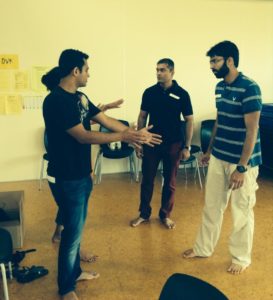 To feed to hunger to share and be heard. The Adda was designed to be a safe, inclusive and diverse gathering of creatives. Apart from a stimulus or a topic for the Adda, the structure was kept decidedly freeform and organic. Over the last 1.5 year I have enjoyed some really unforgettable addas.
To feed to hunger to share and be heard. The Adda was designed to be a safe, inclusive and diverse gathering of creatives. Apart from a stimulus or a topic for the Adda, the structure was kept decidedly freeform and organic. Over the last 1.5 year I have enjoyed some really unforgettable addas.
The first Adda for example, veered towards moments when one’s bubble was popped, i.e. concrete notions like justice, or the understanding of their own privilege, changed. This included horror stories of living alone as a single woman in a large metropolis, the consideration of caste and how it translated to the migrant experience, and the absurdist theatre movement in Singapore as a means of protest. A story shared during one such gathering, that had us gob-smacked and it deserves to be worked into a performance in the future!
Another Adda that was memorable and sobering took place after the 15th March 2019 terrorist attack in Christchurch. The migrant community as a whole was hurting. Themes explored were of diversity and its commodification, racism, intersectionality and the white gaze. The notion of “they are us” was put in the cross-hairs and obliterated by a blistering critique of how migrants were “othered” by micro-aggressions on a daily basis.
An absolute favourite moment of mine has been, the writers’ retreats which were held over a couple of weekends. It was an experience to sit in the room and have 10 writers furiously write and workshop their ideas to make them into theatre-ready scripts.
A reflection about our Adda culture as also the ability to be adjusting and open, like if the Adda was attended by fewer people, we changed it up and had sessions putting pen to paper, and utilised time to write. In the lock down Adda even went online! To our benefit we even had our international whanau joining the Adda from the comfort of their couch across continents!
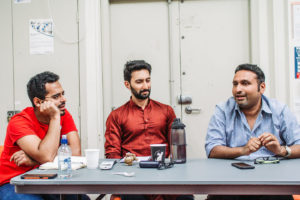
What next for the Adda, then? I want to keep the sessions as organic and free-flowing as they have been. But I also want to be an environment where great ideas can emerge from the banter. I have big plans in store for the future where performance and ideation meet to form an engine room driving forward the South Asian narrative.
For too long have South Asian stories been watered down or co-opted. Even our voices have been Apu-fied and our languages and accents all rolled into a sing-song and head bobble. Yet, each country in the sub-continent has a rich story-telling tradition. Every time a diaspora that has travelled from the subcontinent, pre and post colonial history has straddled two worlds – a home now foreign and a foreign land made home. They have a unique voice, they want to be heard.
So no more will our हल्दी दूध be made into turmeric lattes, no more will our मसाला चहा be turned into a chai tea.
No! Let us brew a strong cuppa (tea) , मस्त अड्डा जमवूया! (Let’s chill over an adda!)
Prateek.
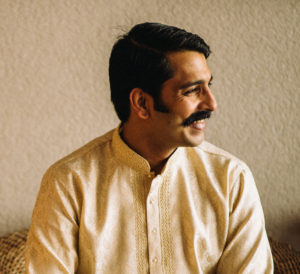
Prateek Vadgaonkar
